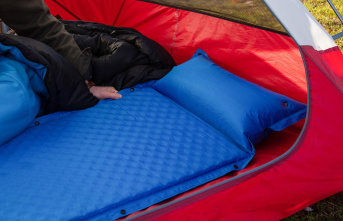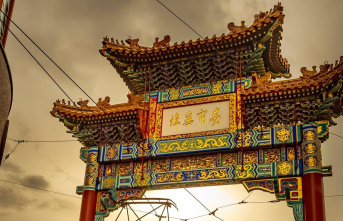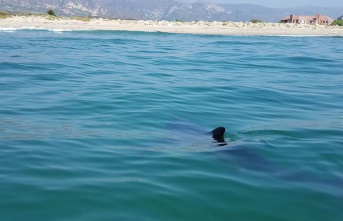Turkey and Moldova, two potential transit countries to the Ukrainian front, are doing what they can to filter fighters. One need only stand in the Air Moldova check-in queue at the gleaming Istanbul airport to feel that something has gone wrong on this side of Europe.
“These are not normal times!” the Turkish employee can be heard exclaiming from behind his tie. His interlocutor, a Georgian in his fifties, dressed in military boots, protests that eight months ago he was already in Moldova “without problems”. “But now there are half a million refugees!” replies the ground staff, who thoroughly question all passengers about the reason for their visit, before checking if they have a return flight and hotel reservation.
In the case of the Georgian, the absence of requirements corroborates the first visual impression. "I'm going to Ukraine," the potential legionnaire admits bluntly. So the Georgian Rambo will stay without getting on the plane, in what had an air of reckoning for the war in which Russia seized South Ossetia and Abkhazia from his country in 2008.
Yes, there will be many Azerbaijani passport holders who, if they were Afghans on the Polish border, would have been defined as "men of military age". So will Maria, a sixteen-year-old girl who explains that, after a month in Istanbul, she returns to her city. Nothing less than Odessa, one step away from the Moldovan border and with the war front getting closer.
"I'm not afraid," says Maria with a beaming expression. “It is much better to be with the family, even if the classes are online.” Several testimonies speak of the practical return to a tense normality in the pearl of the Black Sea. The woman sitting next to her and looking at her quietly but with her eyes wide as saucers, she turns out to be Russian.
One of the effects of this war is that Istanbul is becoming what Tangier was during World War II. Meeting point and hotbed for people and agents from both sides. Although Turkey, attentive to the board, seems to be playing its cards with much more prudence and equidistance than little Moldova. All this despite its incomparably greater demographic and military power and having its back covered by NATO.
Chisinau is also the focus of enormous intrigues, with the difference that Moldova itself - the size of Catalonia, but with a third of its population - is boiling, inside the same pot of pre-war vapours. Few Moldovans dare to put their hands in the fire about the viability of their country as an independent state, without strict neutrality.
Few are sure what their passport will be in a few years, although just in case, more than half have at least two, Moldovan and Romanian (as is known, they speak the same language). In the secessionist Transnistria, overwhelmingly Russian-speaking, these are also found -especially the first- although Russian is much more abundant, while many citizens have also obtained Ukrainian and some Bulgarian, after proving that a grandparent belonged to these minorities. . One of the few businesses in Chisinau that never goes into crisis is citizenship processing. And in the Gagauzia region they play by their own rules.
With or without war, one of the most common and profitable routes for taxi drivers is from Chisinau (pronounced Kishinau) to Palanca, a town on the same border with Ukraine, fifty kilometers from Odessa. "It crosses without problems," they say.
Moldova is as small as it is strategic, especially as a stopper. It has no coastline, but it does have a single tiny port - Giurgiulesti - on the Danube, which is navigable to the Black Sea. This river also has the only Ukrainian ports still active and under the control of Kiev, such as Izmail or Reni - well connected to Istanbul - where the Russian armed forces have not dared to attack so far. Not in vain the Romanian shore opposite is already NATO territory. The drawback for the Ukrainian nationalist power, in this highly mixed area, is that, as in most of the south and east, the population is not ethnically Ukrainian, much less speak Ukrainian.
The problem that has not disappeared in the confines of Palanca, but has become more acute with the war, is that of access from Odessa to the Buchac region. Moldova has never finished ceding to Ukraine the access road to this extensive region of the former Bessarabia, supposed compensation for the 480 meters of Moldovan sovereignty over the Danube coastline. The other access point, a bridge running parallel to the Black Sea, has repeatedly been targeted by Russian missiles.
In any case, the abrupt turn towards Bucharest, Brussels and Washington by President Maia Sandu - who was imposed fifteen months ago thanks to the emigration vote - makes many Moldovans raise their hands to their heads. Not only those thousands - many of them young - who the day before yesterday, Victory Day, dressed in black and orange to honor their grandparents and circumvent their ban on wearing St. George's ribbons (a Russian military symbol and, for three-quarters of a century, Soviet).
The complaint of their elders is that they can no longer watch the parade in Moscow's Red Square on television. But they complain of vice, because at the same time, Moldovan television was offering them a special program about the business and goings-on of their adored opposition leader, the Phil-Russian Igor Dodon, and his daughter.
And in case of boredom, another Moldovan channel interviewed an Orthodox priest under the slogan "Christ is Risen", which also gave its name to a tent in the square facing the former Supreme Soviet, today the seat of the democratic presidency. If his goal was to exorcise the hammer and sickle hordes, he failed, since they were there on May 9, in the morning, and if he intended to swell the ranks of a rumored pro-Ukrainian counter-demonstration, it never materialized.
The smallest of the former Soviet republics remains a delicate crossroads. In Moldova there is no official building without a European Union flag, although then the control of EU passengers, who do not require a visa, is no less glacial. So, at your airport, another round of questions: Travel reasons, return flight and hotel reservation.
On the way back to Istanbul – on an Air Moldova flight where no passenger is wearing a mask – the check must be repeated by an agent (who, if she is a policewoman and wears a hijab, will be doubly punctilious). Any man of military age flying in from Chisinau is likely to see his passport furiously thumbed through and photographed, then asked to leave the window and stand aside to answer questions. These are not normal times and mercenaries of any sign are warned.
4












